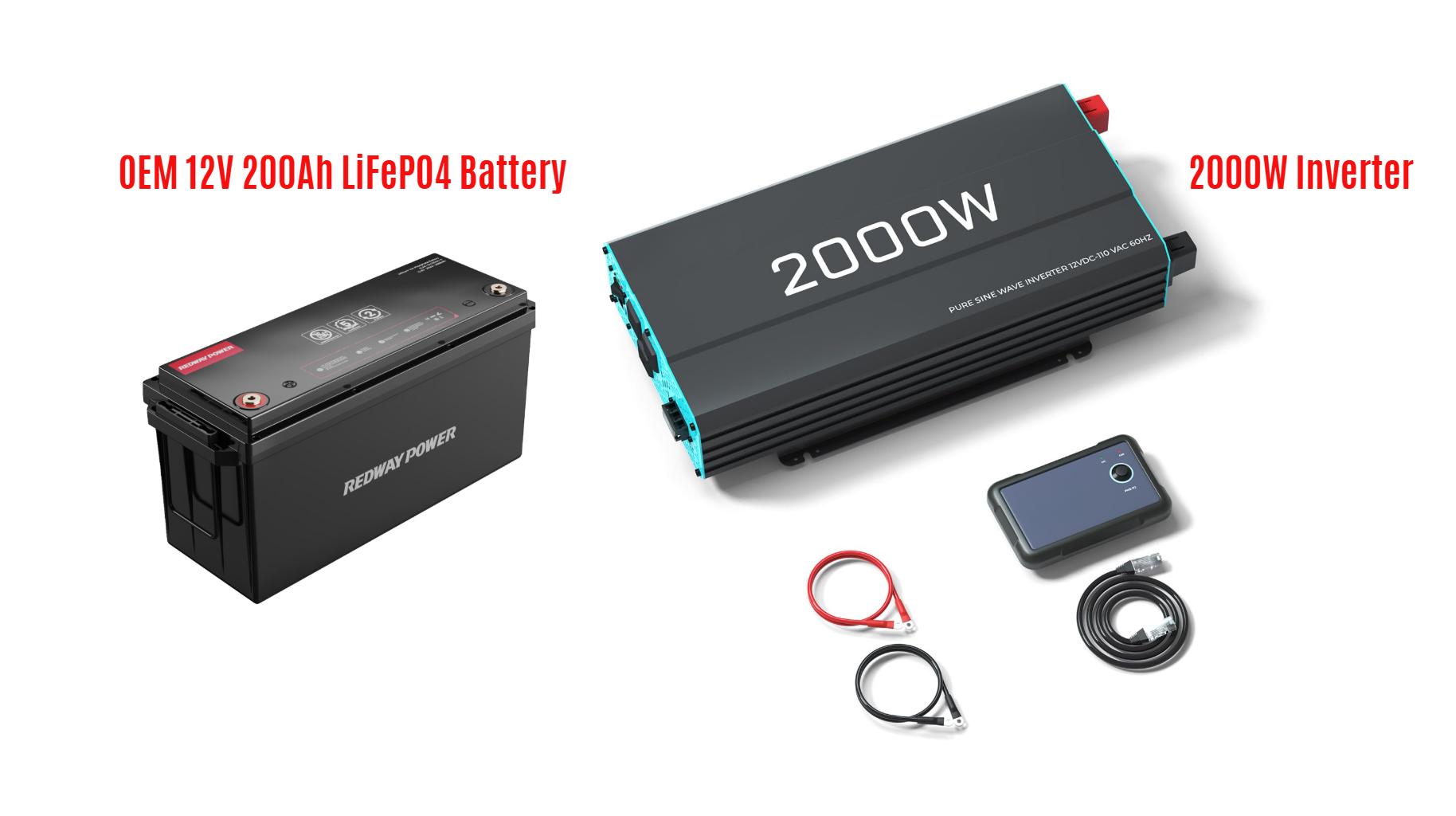
How Long Can a 200Ah Battery Power a 2000W Inverter?
A 200Ah battery can theoretically power a 2000W inverter for approximately 1 to 2 hours under ideal conditions, depending on various factors such as inverter efficiency and depth of discharge (DoD). Understanding these variables is crucial for optimizing your energy usage and ensuring reliable power supply.
How Long Will a 200Ah Battery Last with a 2000W Inverter Under Ideal Conditions?
Under ideal conditions, a 200Ah battery can last approximately 1 hour with a 2000W inverter. This estimate assumes the inverter operates at full capacity without any losses. However, actual runtime may vary based on factors such as inverter efficiency and battery condition.
Under optimal conditions, using the formula:
For example, if we assume a 12V battery system:
This calculation indicates that under perfect conditions, the battery would last about 1.2 hours when running at full capacity.Chart: Estimated Runtime Based on Load
| Load (Watts) | Estimated Runtime (Hours) |
|---|---|
| 2000 | 1.2 |
| 1500 | 1.6 |
| 1000 | 2.4 |
| 500 | 4.8 |
What Factors Affect the Runtime of a 200Ah Battery with a 2000W Inverter?
Factors affecting runtime include battery capacity, load or power consumption, inverter efficiency, battery age and condition, and ambient temperature. Higher loads and lower efficiencies will decrease runtime, while optimal conditions can enhance performance. Several factors can influence how long your battery will last when connected to an inverter:
- Inverter Efficiency: Most inverters operate at efficiencies between 85% and 95%. A lower efficiency means more energy is lost during conversion.
- Load Type: If the load fluctuates or is not constant, this will affect runtime.
- Battery Condition: Age and health of the battery can significantly impact its performance.
For instance, if the inverter operates at 90% efficiency, the effective load becomes:
Using this adjusted load in our runtime formula gives:
How Does Inverter Efficiency Influence Battery Life?
Inverter efficiency directly impacts battery life by determining how much of the stored energy is converted to usable power. A higher efficiency means less energy loss during conversion, allowing the battery to last longer under the same load conditions. Inverter efficiency directly affects how much power is drawn from the battery to produce usable AC power:
- Higher Efficiency: Less energy lost means longer runtime.
- Lower Efficiency: More energy wasted increases the load on the battery, reducing runtime.
For example, if an inverter has an efficiency rating of only 80%, the effective load becomes:
This adjustment would further decrease runtime significantly.
Why Is Depth of Discharge (DoD) Important for Battery Longevity?
Depth of Discharge (DoD) is crucial because it affects the lifespan of the battery. Frequent deep discharges can shorten battery life. Maintaining a lower DoD helps preserve capacity and prolongs the number of charge cycles before significant degradation occurs. The depth of discharge refers to how much of the battery’s capacity is used before recharging:
- Optimal DoD: For lead-acid batteries, it’s recommended not to discharge below 50% to prolong lifespan.
- Lithium Batteries: These can typically handle deeper discharges but still benefit from not being fully discharged regularly.
For example, if you only use 50% of your battery’s capacity:
This would effectively double your runtime under similar conditions.
How Can You Optimize the Use of Your 200Ah Battery with a 2000W Inverter?
To optimize battery use, ensure efficient connections, minimize load when possible, monitor battery health regularly, and avoid deep discharges. Consider using an inverter with high efficiency to maximize usable power from your battery. To maximize efficiency and runtime while using your battery with an inverter, consider these strategies:
- Select Efficient Appliances: Use energy-efficient devices to reduce overall power consumption.
- Monitor Usage: Keep track of how much power you are drawing to avoid overloading.
- Regular Maintenance: Ensure your battery is well-maintained to preserve its capacity and performance.
By implementing these practices, you can extend both the runtime and lifespan of your battery system.
FAQ Section
Q: How long will a fully charged 200Ah battery last with a 2000W inverter?
A: Under ideal conditions, it can last approximately 1 to 1.2 hours, depending on inverter efficiency and load type.Q: What factors affect how long my battery will last?
A: Key factors include inverter efficiency, load type, battery condition, and depth of discharge.Q: Why is depth of discharge important?
A: Maintaining an optimal DoD helps prolong battery life by preventing excessive wear and tear.Q: Can I increase my runtime?
A: Yes, by using more efficient appliances and monitoring your power usage closely.
OEM Tips
For businesses looking to make OEM orders related to batteries or inverters, partnering with established manufacturers like Redway Battery is essential. With over 13 years of experience, Redway specializes in lithium batteries that offer superior performance compared to traditional lead-acid batteries.When placing an OEM order:
- Research potential manufacturers thoroughly.
- Discuss customization options based on specific needs.
- Ensure compliance with local regulations regarding product specifications.
Choosing a reliable partner like Redway Battery can significantly enhance product offerings while meeting consumer demand for high-quality energy solutions.
How to Choose the Right Size Inverter?
To choose the right size inverter, calculate the total wattage of devices you plan to power. Add up their wattages and select an inverter that exceeds this total by at least 20%. Consider surge wattage for devices that require extra power at startup, ensuring your inverter can handle both continuous and peak loads.
LiFePO4 Battery Expert Views
“Understanding how to calculate runtime based on various factors is crucial for anyone relying on batteries for power,” says Dr. Mark Anderson, an expert in energy storage solutions. “By optimizing usage patterns and selecting high-efficiency components, users can significantly extend both runtime and overall system longevity.”
